Near + Far Read online
NEAR + FAR
Stories of the
Near Future and the Far
Cat Rambo
Hydra House
Near + Far
Copyright © 2012 by Cat Rambo
All rights reserved. Except for brief passages quoted in a newspaper, magazine, radio, or television review, no part of this book may be reproduced in any form or by any means, electronic or mechanical, including photocopying and recording, or by any information storage and retrieval system, without permission in writing from the Author or the Publisher.
978-0-9848301-4-5 (print)
978-0-9848301-5-2 (ebook)
Library of Congress Control Number: 2012943112
Hydra House
2850 SW Yancy St. #106
Seattle, WA 98126
http://www.hydrahousebooks.com/
This is a work of fiction. Names, characters, places, and incidents are either the products of the author's imagination or are used fictitiously. Any resemblance to actual events, locales, situations, or persons, living or dead, is purely coincidental.
Cover art by Sean Counley
http://www.seancounley.com/
Cover design by Tod McCoy
Illustrations by Mark W. Tripp
http://www.spiderpig.com/
Text design by Vicki Saunders
Praise for Near + Far
Five reasons to read Cat Rambo:
If you like stories about strange places and strange creatures
If you like stories that leave you yourself feeling a little strange
If you like a good love story
especially one with talking cats, deadly mermaids, mind-altering technologies, live coats, detachable limbs, gorgeous descriptions and great leaps of imagination, wit and power
plus travel through space and time
Then this is the book for you.
Karen Joy Fowler
Cat Rambo's futures are complex, and often dissonant and eerie—they evoke the familiar in their careful world-building, intricate detail and recognizable characters, while simultaneously constructing futures flavored with the strange. Her futures are often unsettling, but never so simple as to be dystopic; her stories inhabit complex, ambiguous worlds. Her simultaneously familiar and unfamiliar settings sharpen her portrayals of human relationships. By recasting core experiences against disjunctive backgrounds, she causes the reader to appreciate them anew. People are always at the center: they fall away from each other, cope with betrayals, seek connections. While the inner eye marvels at her immersive images, the body resonates with the subtle, deft emotions imbued in her characters. Cat Rambo's finest stories shimmer in the memory like the lights of the Aurora Borealis: vivid and eerily illuminating.
Rachel Swirsky
Cat Rambo's stories never go where you expect them to. They twist and turn and end up in strange places—sometimes very strange indeed. Both the stories set on the Earth we know (or think we know) and those set far away will surprise and delight you.
Nancy Kress
Cat Rambo's newest collection shows two sides of her fiction. Powerful prose, coupled with telling details. Not only does the collection flip, physically, it will also turn you on your head. Read with caution: these stories are only safe in small doses.
Mary Robinette Kowal
Near + Far is a survey of the terrain of Cat Rambo's imagination, ranging from small fantasies of the moment to vest pocket planetary romances. She tends to the quiet, internal, disturbing reflection, far more Bradbury than Heinlein. Moving, thought-provoking literature in nicely comestible chunks.
Jay Lake
An exemplary short story collection in both senses of the term—excellent and also a model of what the range of the career of a speculative short story writer should be, and these days unfortunately so rarely is. Wide in its subject matter from the immediate future to the wide open spaces, deep in its psychological characterization when that is the central point, speculatively amusing when it isn't, well-realized almost all of the time, and always entertaining.
Norman Spinrad
NEAR + CONTENTS
The Mermaids Singing, Each to Each
Peaches of Immortality
Close Your Eyes
Therapy Buddha
Ms. Liberty gets a Haircut
10 New Metaphors for Cyberspace
Memories of Moments,
Bright as Falling Stars
RealFur
Not Waving, But Drowning
Vocobox™
Long Enough and Just So Long
Legends of the Gone
INTRODUCTION
If you're holding the physical copy of this book, you're seeing the outgrowth of my theory regarding how electronic publishing will affect books. The book is more than a delivery mechanism for text: it should feel nice in your hands if we've done everything right. You can flip it to find a second set of stories, which I find downright cool. Attention's been paid to the art, both exterior and interior, and we've proofread the heck out of it, so there should be very few typos to distract the reader. It's an object that can be prized in its own right.
This is how, I think, physical books may survive, as objects that are aesthetically pleasing or entertaining in their own right, and which add something to the text they hold. Look at Subterranean Press' strategy of making beautiful, collectible books: I've got more than a few of those on my shelves and I'll keep buying them periodically, despite the fact that I do most of my reading now on the Kindle. That's the kind of book we've tried to put together.
If you're reading this electronically, we've tried to make the most of that as well. You'll find there's an accompanying mobile device app (or will be, Goddess willing, by the time this comes out) that lets you access extra material, including audio recordings of several stories.
I am incredibly pleased with this book. It's allowed me to work with some of my very favorite people, and particular shouts should go out to: Tod McCoy, without whom this book would not have been possible; Vicki Saunders, for incredible design skills and meticulous work; Mark W. Tripp, for allowing me to use some of the art he's been showing me for over a decade; Sean Counley, for his gorgeous cover art; Jo Molnar, who kindly pruned typos and corrected embarrassing misspellings; and Wayne Rambo, who provided support, encouragement, and occasional nagging. You guys rock, and you rock hard.
The stories themselves come from close to a decade of writing. Sometimes when you're writing, you feel you're leveled up, that you've moved through some plateau and jumped to a new degree of skill. Some of these stories are ones that let me know I'd leveled up. I hope you enjoy them all.
THE MERMAIDS SINGING, EACH TO EACH
Niko leaned behind me in the cabin, raising his voice to be heard over the roar of engine and water. "When you Choose, which is it going to be? Boy or girl?"
I would have answered, if I thought it really mattered to him. But we were off shore by then, headed for the Lump, and he was just making conversation, knowing how long it would take us to get there. He didn't care whether I'd be male or female, I'd still be his pal Lolo. I could feel the boat listening, but she knew I didn't want her talking, that I'd turn her off if she went too far.
So I kept steering the Mary Magdalena and said I didn't know, and it didn't matter, unless we did manage to cash in on the Lump before the corp-strippers got there. After that we were silent again, and everything was just the engine rumble moving up through my feet. Jorge Felipe turned over in the hammock we'd managed to fit into the cabin, hammering the nails into the paneling to hang the hooks. He let out something that was either snore or fart or maybe both.
Jorge Felipe was the one who had found out about the Lump. It was four or five kilometers across, the guy who'd spotted it said. Four or five kilometers of
prime debris floating in the ocean, bits of old plastic and wood and Dios knew what else, collected by the currents, amassed in a single spot. All salvageable, worth five new cents a pound. Within a week, the corp-stripper boats would be out there, disassembling it and shoveling all that money into company machines, company mouths.
But we were going to get there first, carve off a chunk, enough to pay us all off. I wanted to be able to Choose, and I couldn't do that until I could pay the medical bill. Niko said he wasn't saving for anything, but really he was—there'd be enough money that he could relax for a month and not worry about feeding his mother and his extended family.
Jorge Felipe just wanted out of Santo Nuevo. Any way he could escape our village was fine with him, and the first step was affording a ticket. He wanted to be out before storm season hit, when we'd all be living on whatever we could manage until a new crop of tourists bloomed in the spring.
Winter was lean times. Jorge Felipe, for all his placid snoring right now, was feeling desperation's bite. That's why he was willing to cut me in, in exchange for use of the Mary Magdalena. Most of the time he didn't have much to say to me. I gave him the creeps, I knew. He'd told Niko in order to have him tell me. But he didn't have any other friends with boats capable of going out to carve off a chunk of the Lump and bring it in for salvage. On my side of things, I thought he was petty and mean and dangerous. But he knew the Lump's coordinates.
I tilted my head, listened to the engines, checking the rhythms to make sure everything was smooth. The familiar stutter of the fan from behind me was nothing to worry about, or the way the water pump coughed when it first switched on. I knew all of Mary Magdalena's sounds. She's old, but she works, and between the hydro-engines and the solar panels, she manages to get along.
Sometimes I used to imagine crashing her on a reef and swimming away, leaving her to be covered with birdshit and seaweed, her voice pleading, as long as the batteries held out. Sometimes I used to imagine taking one of the little cutting lasers, chopping away everything but her defenseless brainbox, deep in the planking below the cabin, then severing its inputs one by one, leaving her alone. Sometimes I imagined worse things.
I inherited her from my uncle Fortunato. My uncle loved his boat like a woman, and she'd do things for him, stretch out the last bit of fuel, turn just a bit sharper, that she wouldn't do for me or anyone else. An abandoned woman now, pining for a lover who'd moved on. I could have the AI stripped down and retooled, re-imprint her, but I'd lose all her knowledge. Her ability to recognize me.
I'd left the cabin the way my uncle had it: his baseball cap hanging on the peg beside the doorway, his pin-up photos shellacked onto the paneling. Sometimes I thought about painting over the photos. But they reminded me of my uncle, reminded me not to forgive him. You would have thought they would have been enough, but maybe they just egged him on. Some people claim that's how it goes with porn, more and more until a man can't control himself.
I can't say my experience has confirmed this.
Uncle Fortunato left me the Mary Magdalena from guilt, guilt about what he'd done, guilt that his niece had decided to go sexless, to put away all of that rather than live with being female. I was the first in the village to opt for the Choice, but not the first in the world by a long shot. It was fashionable by then, and a lot of celebrities were having it done to their children for "therapeutic reasons." My grandmother, Mama Fig, said it was unnatural and against the Church's law, and every priest in the islands came and talked to me. But they didn't change my mind. There was a program funding it for survivors of sexual assault. That's how I got it paid for, even though I wouldn't tell them who did it.
I couldn't have him punished. If they'd put him away, my grandmother would have lost her only means of support. But I could take myself out of his grasp by making myself unfuckable. Neuter. Neuter until I wanted to claim a gender. They didn't tell me, though, that getting in was free, but getting out would cost. Cost a lot.
When I first heard he'd left the boat to me, I didn't want her. I let her sit for two weeks gathering barnacles at dock before I went down.
I wouldn't have ever gone, but the winter was driving me crazy. No work to be found, nothing to do but sit home with my grandmother and listen to her worry about her old friends' children and her favorite soap opera's plotlines.
When I did go to the Mary Magdalena, she didn't speak until I came aboard. First I stood and looked at her. She's not much, all told: boxy, thirty years out of date, a dumbboat once, tweaked into this century.
I used to imagine pouring acid on her deck, seeing it eat away at the wood with a hiss and sizzle.
As I made my way up the gangplank, I could feel that easy sway beneath my feet. There's nothing like being on a boat, and I closed my eyes just to feel the vertigo underfoot like a familiar friend's hand on my elbow.
I used to imagine her torn apart by magnets, the bolts flying outward like being dismantled in a cartoon.
"Laura," a speaker said, as though I hadn't been gone for six years, as though she'd seen me every day in between. "Laura, where is your uncle?"
I used to imagine her disintegrated, torn apart into silent atoms.
"It's not Laura anymore," I said. "It's Lolo. I'm gender neutral."
"I don't understand," she said.
"You've got a Net connection," I said. "Search around on "gender neutral" and "biomod operation."
I wasn't sure if the pause that came after that was for dramatic effect or whether she really was having trouble understanding the search parameters. Then she said, "Ah, I see. When did you do that?"
"Six years ago."
"Where is your uncle?"
"Dead," I said flatly. I hoped that machine intelligences could hurt and so I twisted the knife as far as I could. "Stabbed in a bar fight."
Her voice always had the same flat affect, but I imagined/hoped I could hear sorrow and panic underneath. "Who owns me now?"
"I do. Just as long as it takes me to sell you."
"You can't, Laura."
"Lolo. And I can."
"The licenses to operate—the tourism, the sport-fishing, even the courier license—they won't transfer to a new owner. They won't pay much for a boat they can't use."
"Oh, I don't know," I said. "You'd fetch a decent amount as scrap."
She paused again. "Keep me going, Lolo, and you can take in enough to keep yourself and Mama Fig afloat. Your uncle had ferrying contracts, and every season is good for at least a couple of trips with very cheap or eccentric tourists."
She had grace enough not to push beyond that. I didn't have much choice, and it was the only way to support my grandmother and myself month to month. With the Mary Magdalena, I was better off than Niko or Jorge Felipe by far. I could afford the occasional new shirt or record, rather than something scavenged.
At the end of a year, we'd reached an agreement. Most of the time now, the boat knew better than to talk to me. She could have been with me everywhere. Button mikes gleamed along the front railing, in the john, even in the little lifeboat that hugged the side. But she stayed silent except in the cabin, where she would tell me depths, weather, water temperature. I told her which way to go. Businesslike and impersonal.
Niko went out on deck. I didn't blame him. It was too warm in the cabin. I knew the Mary Magdalena would alert me if there was any trouble, but I liked to keep an eye on things.
Jorge Felipe stirred, stuck his head out over the hammock's edge. His dark hair extended in all directions, like broken broom straws.
"Morning yet?" he rasped.
"Couple more hours."
"Where's Niko?"
"Went to smoke."
He grunted. "Shit, it's hot in here," he said. He swung his legs out from under the blanket's basket-weave, thumped onto the floor. "We got soup left?"
"Thermos in the cupboard."
Behind me the microwave beeped out protests as he thumbed its controls. The display was a steady, grainy green, showing me the su
rface far below the boat. Drifts and ridges. They said you could spot a wreck by the unnatural straightness of a line, the oddness of a corner. Unlikely, but it had been heard of, in that friend-of-a-cousin-of-a-neighbor's sort of way.
"Heat me one," I said.
"Soup or coffee?"
"Coffee," I said, and he clanked another mug into the microwave.
Niko came into the doorway. "Mermaids out there," he said. "Be careful if you swim."
Jorge Felipe handed me my mug, so hot it almost bit into my skin as I cupped it.
"Fucking mermaids," he said. "I hate them even worse than sharks. One tangled with my sister, almost killed her."
"Everyone on the island's tangled with your sister. I'm getting coffee and going back out," Niko said, and did.
Jorge Felipe watched him go. "He's fucking obsessed with those mermaids."
Mermaids. Back before I was born, there were more tourists. There's always tourists now, but not quite as many. Some of them came here specifically, even, for the beaches. Or for the cheap black-market bio-science. And one black-market bio-scientist specialized in making mermaids out of them.
They paid a lot for it, I guess. A moddie body that they could go swimming in, pretend like they were always sea creatures. It was very popular one year, Mama Fig said.
But the scientist, he wasn't that good, or that thorough. Or maybe he didn't understand all the implications of the DNA he was using. Some people said he did it deliberately.
Because mermaids lay eggs, hundreds at a time, at least that kind did. And the natural-born ones, they didn't have human minds guiding them. They were like sharks—they ate, they killed, they ate. Most of the original human mermaids had gotten out when they found out that the seas were full of chemicals, or that instead of whale songs down there, they heard submarine sonar and boat signals. When the last few discovered that they were spawning whether they liked it or not, they got out too. Supposedly one or two stayed, and now they live in the sea with their children, twice as mean as any of them.

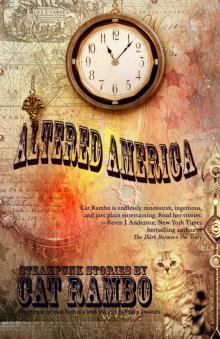 Altered America
Altered America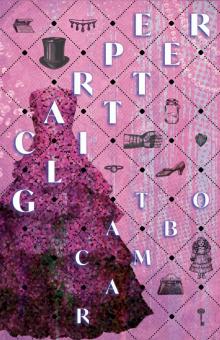 Carpe Glitter
Carpe Glitter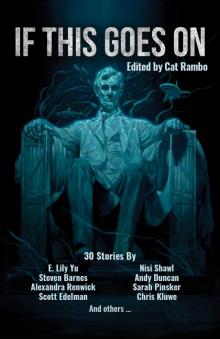 If This Goes On
If This Goes On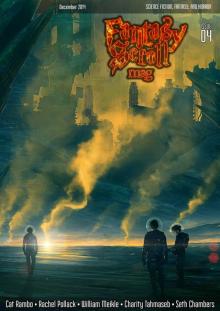 Fantasy Scroll Magazine Issue #4
Fantasy Scroll Magazine Issue #4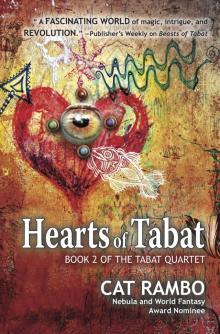 Hearts of Tabat
Hearts of Tabat Beneath Ceaseless Skies #151
Beneath Ceaseless Skies #151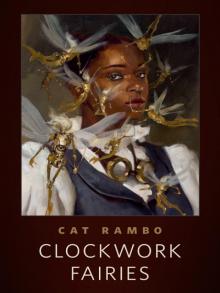 Clockwork Fairies
Clockwork Fairies Beneath Ceaseless Skies #170
Beneath Ceaseless Skies #170 Sugar
Sugar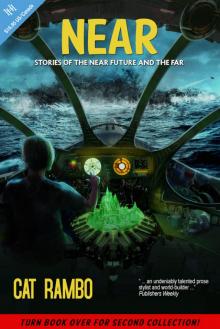 Near + Far
Near + Far Eyes Like Sky And Coal And Moonlight
Eyes Like Sky And Coal And Moonlight